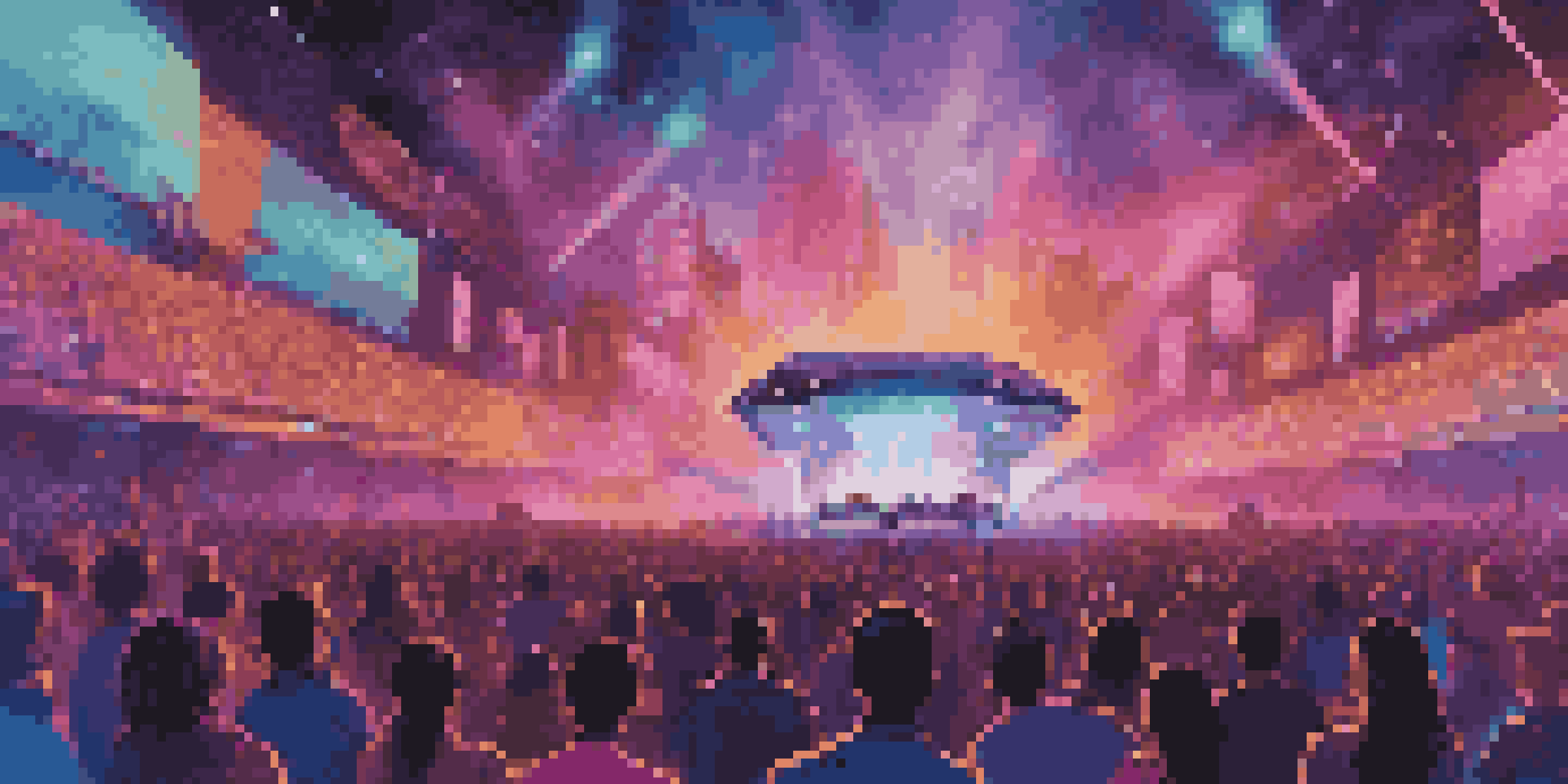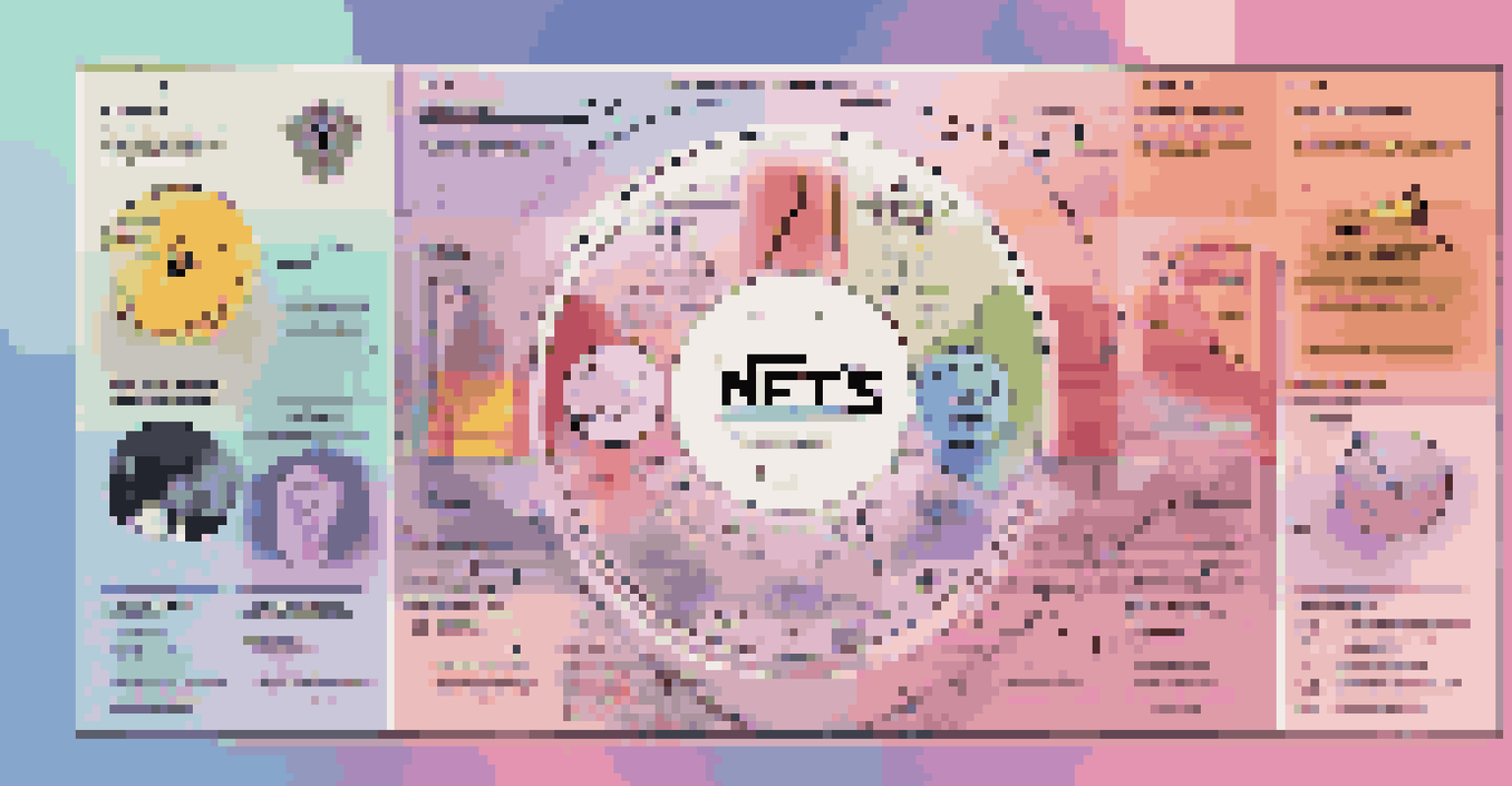The Impact of NFTs on the Music Industry: A New Frontier

Understanding NFTs and Their Role in Music
NFTs, or non-fungible tokens, are unique digital assets that represent ownership of a specific item, often secured on a blockchain. In the context of music, they offer artists a new way to monetize their work by creating digital collectibles that fans can buy. For example, musicians can sell exclusive tracks, concert tickets, or even behind-the-scenes content as NFTs.
The future of music is not just about listening; it's about participating, creating, and sharing with the artists we love.
This innovative approach not only allows artists to retain a larger share of their revenue but also fosters a deeper connection with their fans. Imagine owning a unique piece of your favorite artist's work, something that can't be replicated or copied. It creates a sense of exclusivity and personal investment in the artist's journey.
As more artists embrace NFTs, we're witnessing a shift in how music is consumed and valued. The traditional model, heavily reliant on streaming and sales through established platforms, is being challenged by this new digital frontier.
Empowering Artists through Direct Sales
One of the most significant impacts of NFTs is the empowerment they provide to artists. Instead of relying on record labels or streaming platforms, musicians can sell their work directly to fans. This not only increases their earnings but also allows them to build a loyal community around their brand.

For instance, an artist might release a limited edition album as an NFT, with each token representing ownership of a digital copy. This means that fans are not just consumers; they are stakeholders in the artist's success, creating a more engaged fanbase.
NFTs Empower Artists' Revenue
NFTs allow musicians to sell their work directly to fans, increasing their earnings and fostering community engagement.
By cutting out middlemen, artists can also enjoy greater creative freedom. They can choose how they want to present their music and what additional content to include, fostering a more personal and authentic connection with their audience.
Revamping Music Distribution Models
The rise of NFTs is prompting a reevaluation of traditional music distribution models. Instead of the conventional album release strategy, artists can now drop various NFT offerings over time, keeping fans engaged and excited. This model mirrors the way many independent artists operate, allowing for more flexibility and creativity.
In a world where art can be replicated endlessly, NFTs provide a way to own a piece of something truly unique.
Imagine an artist releasing a new song as an NFT every month, each accompanied by unique visuals or experiences. This not only keeps the artist's work fresh in fans' minds but also encourages ongoing support and investment.
As distribution models evolve, we may see a decline in the dominance of major streaming platforms, as artists find alternative ways to reach their audience and generate revenue.
The Role of Fan Engagement in NFTs
Fan engagement is crucial in the NFT space, as it directly influences an artist's success. NFTs encourage fans to participate in the creative process, often allowing them to vote on aspects of future projects or access exclusive content. This participatory approach fosters a sense of belonging and loyalty.
For example, some artists have offered fans the chance to co-create a song or influence the direction of their next album through NFT ownership. This not only strengthens the artist-fan relationship but also taps into the growing trend of community-driven experiences.
Revolutionizing Music Distribution
The adoption of NFTs is changing traditional music release strategies, enabling artists to engage fans with ongoing offerings.
As fans become more involved, they feel personally connected to the music, creating a new ecosystem where artists and fans thrive together.
Challenges and Controversies Surrounding NFTs
While NFTs present exciting opportunities, they also come with challenges and controversies. One major concern is the environmental impact of blockchain technology, as the energy required for minting NFTs can be substantial. This has led to criticism from those who advocate for more sustainable practices in the music industry.
Additionally, the volatility of the NFT market poses risks for both artists and collectors. Prices can fluctuate dramatically, which may lead to financial losses for those who invest heavily in NFTs without understanding the market.
Navigating these challenges will be crucial for the long-term success of NFTs in the music industry, as artists and fans alike seek sustainable and stable solutions.
NFTs and Intellectual Property Rights
Intellectual property (IP) rights are another significant aspect of the NFT conversation. When an artist sells an NFT, what rights are transferred to the buyer? This can create confusion, as not all NFTs grant ownership of the underlying rights to the music itself.
For instance, a musician might sell an NFT that includes a song but retains the rights to the music for streaming platforms. It's essential for both artists and buyers to understand what they're purchasing to avoid legal complications later.
Challenges in the NFT Landscape
Despite the opportunities, NFTs come with challenges such as environmental concerns and the complexities of intellectual property rights.
As the NFT space matures, clearer guidelines and standards around IP rights will be necessary to protect both creators and collectors.
The Future of Music through NFTs
Looking ahead, NFTs could shape the future of the music industry in profound ways. As technology evolves, new opportunities for creativity and collaboration will emerge, allowing artists to experiment with formats and experiences that were previously unimaginable. This could lead to a more dynamic and diverse music landscape.
Imagine virtual concerts where ticket holders receive exclusive NFT merchandise, or collaborative albums where fans contribute directly to the songwriting process. The possibilities are endless, as NFTs open doors to innovative ways of creating and sharing music.

While the journey is still in its early stages, the potential for NFTs to revolutionize the music industry cannot be understated. As artists and fans continue to explore this new frontier, we may witness a renaissance in music that prioritizes creativity, community, and genuine engagement.